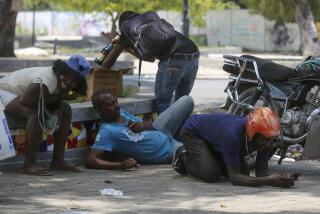Haitian Aides Criticize Carter Role : Caribbean: One official labels as ‘arrogance’ the former President’s political advice to Aristide. Powell and Nunn arrive.
- Share via
PORT-AU-PRINCE, Haiti — Senior officials of President Jean-Bertrand Aristide’s government stepped up their criticism of Jimmy Carter on Friday as two important U.S. military-political figures arrived to join the former President’s review of the Haitian political process.
“His arrogance is terrible, terrible,” one Aristide aide said of Carter’s call for the Haitian leader to remain neutral in parliamentary elections coming in June to allow his opponents a chance to win seats in the national legislature.
Carter made the demand in meetings Thursday, said Leslie Voltaire, a senior Aristide adviser, along with urging that several small, right-wing parties unify into larger groupings to strengthen their chances.
Earlier, Carter was reported to have urged that Aristide’s political movement not run candidates in all the coming parliamentary races to allow the formation of a responsible opposition, a suggestion rejected by Gerard Pierre-Charles, leader of the presidential party.
While Voltaire quoted the Haitian president as saying he would “try to be a referee” in the election, aides said privately that Aristide was not about to make it easier for his opponents, particularly those who supported the 1991 military coup that sent him into a three-year exile.
Sharpening the Haitian apprehension that Carter seeks to weaken Aristide’s political hold was the arrival Friday of retired Gen. Colin L. Powell, former chairman of the U.S. Joint Chiefs of Staff, and Sen. Sam Nunn (D-Ga.).
The formal reason for the visit of the three, who brokered an accord last September for the departure of Haiti’s brutal military regime, is to measure the accomplishments of the restored Aristide government and the progress of plans to hold elections.
In his self-assumed role as a promoter and monitor of international democratic elections, Carter has often sought to expand the political involvement of all sectors of the countries he has become involved in and has argued for increased toleration of differing views.
But one Haitian political expert said Aristide worries that Carter, Nunn and Powell, in particular, are here not only to weaken his hold on power but to chastise him for reducing the Haitian army to a tiny border patrol and ordering the retirement of all senior military officers.
“Aristide thinks Powell will insist that he reconstitute the army,” the Haitian source said. “I don’t believe Powell will do that, but Aristide’s concerns indicate the perceptions and paranoia this visit has created here.”
Voltaire said Carter on Thursday asked Aristide “to spell out his policy on the army.” Aristide reasoned that, while the constitution requires an army, it is silent on the force’s size or that it should even have an officer corps, Voltaire said.
The alarmist Haitian perceptions were outlined by a senior Haitian government official who said Carter’s demand that all elements of the country’s political structure be included in the Parliament was “a naive democratic concept, a stupid kind of surrealism . . . with very sinister consequences.”
“If Mr. Carter accepts the idea that a Nazi or the Ku Klux Klan should be represented in Congress, I’ll accept that . . . politicians and parties who supported the (1991) coup and Aristide’s exile” should be in Parliament, said the official.
Most political experts here, including American diplomats, believe that Aristide supporters will win overwhelmingly in the June legislative voting, taking as many as 80% of the seats.
That Carter wants the Aristide opposition to unite was supported by Duly Brutus, a leader of the right-wing forces.
Brutus, who as a member of the House of Deputies backed the coup and sought to keep Aristide from returning, said in an interview Friday that Carter had told him and other anti-Aristide politicians that they should set aside their differences and “regroup.”
Carter, after hearing complaints from opposition leaders “of a lack of will (by Aristide) to compromise, suggested that we form no more than four parties,” Brutus said. There are now 17 registered anti-Aristide parties.
Carter and his colleagues spent most of Friday meeting with officers of U.S. troops stationed here and taking helicopter tours of the countryside. In spite of the coldness between Aristide and Carter, the Haitian president organized a dinner for the visitors.
All three are to return to the United States today after they conduct more political meetings and receive honorary degrees from a vocational trade school.
Meantime, in Washington, top State Department and Pentagon officials gave a generally upbeat assessment of the Haiti situation to members of the House International Relations Committee.
They said the U.S.-led multinational force will give way to a U.N. contingent on schedule March 31 and that the United Nations will withdraw next February.
“We know of no organized group capable of seriously threatening the Haitian government or the international presence, including the American forces,” Defense Undersecretary Walter B. Slocombe said.
Deputy Secretary of State Strobe Talbott said the American military intervention that restored Aristide to power “has set a new standard for the degree of peace and civic order that has been kept in a peacekeeping operation.”
Times staff writer Norman Kempster in Washington contributed to this report.
More to Read
Sign up for Essential California
The most important California stories and recommendations in your inbox every morning.
You may occasionally receive promotional content from the Los Angeles Times.













